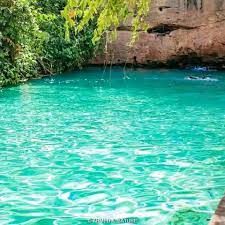Almost every state in every country has a unique nature that calls for international if not global talks. The Wikki Warm Spring in Bauchi State isn’t left out in this opinion.
However, the spring originated from underground geothermal activity and is classified as natural warm springs, where water is heated by the earth's internal heat as it travels through porous rocks and geothermal reservoirs beneath the surface. This process results in the spring's consistent temperature of around 31°C (88°F) all year round.
It emerged from a fissure of the earth, where the heated groundwater flows out and forms a crystal-clear pool that stretches over 13 meters wide and 1.9 meters deep. This helps to provide a steady flow rate of about 21,000 litres per hour and ensures that the water remains clean and fresh, making it ideal for swimming for all ages and other recreational activities done there.
Its geological setting within the Yankari National Park contributes to its pristine look as it is surrounded by forests and wildlife, giving it ecological balance. Here, the kind of natural appearance of the spring boosts the interaction between the region’s geology and geothermal energy, giving huge credit to Nigeria’s unique natural features and global talks.
Meanwhile, there’s always a particular mythological interpretation specular to every natural gift as the Wikki spring. Just like the Ogbunike cave in Anambra State, the local lore gives a mythical explanation for the Wikki spring’s creation, often passed down through oral traditions from one generation to another generations. That said, the name “Wikki” is derived from the Duguri language spoken by some of the indigenous communities, meaning “Where are you?”, and, or ‘Where you dey'? (In the Nigerian pidgin English). So, according to a popular legendary story, the spring was discovered by hunters searching for a missing companion. As they wandered through the forest calling out “Wikki?” they stumbled upon the warm and inviting waters of the spring. The story symbolizes discovery, mystery, and the natural beauty of the region in Bauchi State.
Similarly, a different version of the myth speaks of the spring being a divine blessing, meant to provide life-sustaining water to the surrounding communities due to its nature of steady rush. Some also believe the waters possess healing properties, making them sacred and a symbol of spiritual purity. These myths have added to the allure of the Wikki Warm Spring, making it a cherished element of local heritage over the years.
Consequently, the Wikki Warm Spring is surrounded by communities with deep cultural ties to the area. The people are predominantly Hausa, Fulani, and Tangale, along with other ethnic groups living with them there. They rely on the land for farming, herding, and other traditional livelihoods that earn them a living. The spring holds cultural importance for the locals, who view it as not only a natural wonder but also a spiritual juncture.
Ceremonies and rituals are occasionally held near the spring, rooted in beliefs about its mystical powers. For instance, annual rituals, and invocation of the spirits of the water. For the Bauchi State people, the spring is more than a tourist attraction; it is a symbol of life, community, and connection to nature. These practices reflect the deep respect and symbiotic relationship the people have with their environment from their forefathers.
In Nigeria today, the Wikki Warm Spring is a central feature of Yankari National Park, which serves as Nigeria’s premier wildlife sanctuary. It attracts thousands of visitors each year, making it a significant contributor to the local economy through tourism. Given this, saying it’s a glory to Nigeria is never a mistake.
Because the spring is not just a recreation, but also an educational and cultural hub that showcases the rich history and traditions of Bauchi State.
By and large, the Wikki Warm Spring is a natural and cultural gem with origins steeped in both geological phenomena and local legend which is seen to do more good in terms of tourism for Nigeria in many years to come. The warm waters, mystical myths, and significance to the people of Bauchi make it an essential part of Nigeria’s ancestry.
Picture credits: Wikkidata

